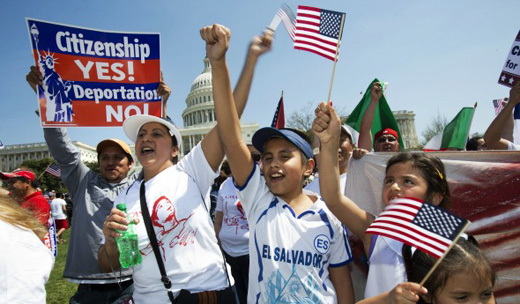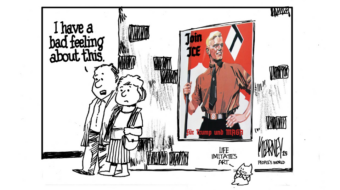
The 2016 presidential elections have put the issue of immigration reform before the U.S. electorate in a new dramatic form, as Republican candidates vie with each other to gain Tea Party votes by defaming immigrants and issuing threats of massive deportation sweeps. And although the Obama administration has pushed more humane and inclusive policies, the recent move by officials in Texas to deny birth certificates to U.S. citizen children of undocumented immigrants, and many other discriminatory policies of this kind, will continue to harm innocent immigrants and their families.
Meanwhile, efforts to bring some sanity and humanity into U.S. immigration policy are stalled in Congress and the courts. There is, with the present GOP majority and hyper-partisanship in Congress, no chance in the short run to achieve the passage of a humane immigration reform. And efforts by the Obama administration to give some relief to non-criminal undocumented immigrants and their families via presidential executive orders have been blocked by litigation.
In 2012, the Obama administration announced the DACA (Deferred Action for Childhood Arrivals) program, which gives temporary relief from deportation plus work permits to the “Dreamers”, young undocumented immigrants who were brought to the United States by their families when they were minor children. DACA has been a major success story, with at least 700,000 of such young people benefitting so far.
In 2014, the Obama administration expanded DACA by eliminating the upper age limit at which one could apply; in other words, one still has to have been brought here as a minor child but subsequently is not “aged out” from applying. In addition, Obama announced a new program, DAPA, Deferred Action for Parents of Americans [i.e. U.S. citizens] and Lawful Permanent Residents. The DAPA program is designed to correct the situation whereby U.S. citizen children can be separated by their undocumented immigration parents through deportation. This has been, for several years, a major demand if the immigrants’ rights movement and its allies. So the announcement of the expansion of DACA and DAPA was a major victory for the movement, even though these programs are far from dealing with the immigrants’ rights movement’s full set of demands, let alone “solving” the immigration problem permanently.
However, in February of 2015 twenty six Republican state attorneys’ general managed to get a conservative federal judge in Texas to suspend implementation of expanded DACA and DAPA, a decision which an appeals court subsequently upheld. The argument of the attorneys’ general was that the Obama administration was exceeding its authority. Texas, which took the lead in this case, argued that the implementation of these programs would cost its taxpayers money because the state would have to issue drivers’ licenses to many newly eligible people-this was Texas’ method of establishing its “standing” in the case, or right to go to court.
The Obama administration, supported by many constitutional law experts, has appealed the case to the Supreme Court. Earlier this year the Supreme Court decided that it would hear the case in the first half of this year, probably in April. If the Supreme Court supports the Obama administration, it will mean that the government can start processing applications for DAPA and expanded DACA.
A new study by the Migration Policy Institute and the Urban Institute explores the benefits that would accrue from DAPA. The study’s authors emphasize that DAPA and DACA together would not only help about 5 million undocumented immigrants (3.6 million through DAPA), but directly benefit at least 10.2 million people, including U.S. citizen children and spouses of individuals who would otherwise be deported.
A large proportion of undocumented immigrants live in “mixed status” households: One parent may be undocumented, the other a Lawful Permanent Resident, and in very many cases, the children are born U.S. citizens. Up to 85 percent of minor children in households where at least one parent is undocumented are, themselves, U.S. citizens by birth or naturalization; many others are Lawful Permanent Residents.
Deportation of a family member and especially a breadwinner, has a devastating effect on all members of mixed status families. The consequent loss of income, often more than 70 percent of the total household budget, can amount to a move from near poverty to abject poverty. Nonworking spouses can be forced into the workforce, typically for very low wages (and then face the problem of finding affordable daycare). People who own their own homes will lose them because of inability to make mortgage or property tax payments.
Other bills will go unpaid causing bankruptcy. People who were supporting poor relatives by sending remittances to them in Mexico or Central America will no longer be able to do it. So those families will be plunged into deeper poverty, increasing the chances that they will see no other option than to migrate to the United States themselves -without immigration papers, because the United States does not give immigration visas to poor farmers from Guatemala or fishermen from Honduras.
The impact on children of the deportation of a parent is catastrophic as well, leading to a decline in nutrition and housing standards, instability in home and community life, and problems in school. Not just the loss of a loved parent due to deportation, but the daily fear that they might come home from school one day and find their mother or father gone, leads to severe anxiety and depression in such minor children.
It is easy for anti-immigration zealots to simply say “take your so-called U.S. citizen brats with you when we deport you”. But this amounts to deporting U.S. citizen minors from difficult conditions in the United States to far worse, even life-threatening conditions in a country they may not ever have seen.
According to the conclusions of the Migration Policy Institute/Urban Institute study, the implementation of DAPA would have very great economic benefits for undocumented immigrants and their families, including millions of U.S. citizens and lawful permanent residents. Family incomes would be greatly increased, by about $3,000 on the average, and home stability would improve. It would also be beneficial to the communities in which they live and to the society as a whole.
The study does not say so, but federal, state and local tax revenue would also be positively impacted; if people can earn more with legal status than they would without it, they will also pay more in taxes at every level as well as spending more on goods and services. This clearly undermines the argument of the state of Texas that it would suffer financial losses due to DACA and expanded DAPA.
But even if the Obama administration wins this case, the problem of U.S. immigration policy is far from being solved. DACA and DAPA do not cover people who arrived after the beginning of 2014, so the thousands of child and family refugees who have arrived from the impoverished and hyper violent “Northern Triangle” countries of Central America – Guatemala, Honduras and El Salvador-over the past two years do not benefit from it.
The United States has convinced Mexico to help out with this “immigration problem” by increasing its own pace of deportation of Central American undocumented immigrants living in Mexico, and beefing up patrols of the Mexico-Guatemalan border. As a result, while deportations from the United States have dropped, deportations from Mexico to Central America have risen sharply.
Migrants trying to get from the Northern Triangle countries to the United States, therefore, are seeking out even more dangerous routes to evade both Mexican and U.S. authorities, leading to more danger and hardship, and more deaths. Human rights and other organizations have now raised the demand that to deal with the Central American “child migrant” and “family migrant” problem, the United States should recognize this as a refugee problem and grant Temporary Protected Status to such migrants. Such status is frequently granted to people displaced by wars and natural disasters, so there is a strong precedent. More than 270 labor, immigrants’ rights and civic organizations sent a letter to the Obama administration January 25 asking for this status to be granted to the Central American refugees.
This demand is supported by 140 Democratic Party members of the House of Representatives and 22 Democratic senators, including presidential candidate Bernie Sanders. This is consistent with Senator Bernie Sanders’ criticism of the Obama administration’s policy of repatriating the child migrants , and of Hillary Clinton’s initial statements in support of that policy. (Sanders is one of the few U.S. members of Congress who has taken a personal interest in Central American affairs, having been a vocal opponent of the Reagan administration’s “Contra Wars” in Nicaragua during the 1980s, and having traveled to Honduras and met with poor rural people there in subsequent years.)
Both Sanders and Clinton support the administration’s DAPA and expanded DACA programs.
But deportations continue, often scooping up people who have not committed crimes and who represent no threat to the public. The Department of Homeland Security is violating its own stated policy, contained in a 2014 ICE memo on priorities for deportation, by detaining and deporting them. And even Temporary Protected Status is a stopgap which can be withdrawn by a subsequent administration. The goal still has to be a humane and comprehensive immigration reform which gives immigrants the same civil and legal rights as the rest of us, including the right to join a union at work and fight for better wages and working conditions and more justice for all.
Photo: Jacquelyn Martin/AP










